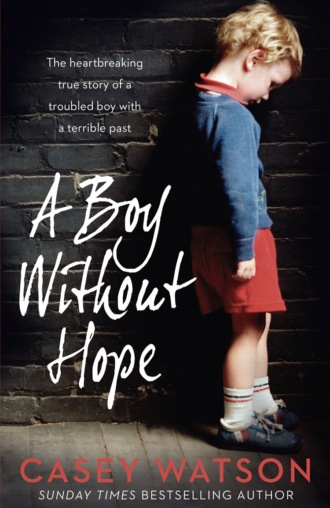
Полная версия
A Boy Without Hope


Copyright
This is a work of non-fiction based on the author’s experiences. In order to protect privacy, names, identifying characteristics, dialogue and details have been changed or reconstructed.
HarperElement
An imprint of HarperCollinsPublishers
1 London Bridge Street
London SE1 9GF
www.harpercollins.co.uk
First published by HarperElement 2018
FIRST EDITION
© Casey Watson 2018
A catalogue record of this book is available from the British Library
Cover image © Jim Powell/Alamy Stock Photo (posed by model)
Cover layout © HarperCollinsPublishers 2018
Casey Watson asserts the moral right to be identified as the author of this work
All rights reserved under International and Pan-American Copyright Conventions. By payment of the required fees, you have been granted the nonexclusive, non-transferable right to access and read the text of this e-book on screen. No part of this text may be reproduced, transmitted, downloaded, decompiled, reverse engineered, or stored in or introduced into any information storage retrieval system, in any form or by any means, whether electronic or mechanical, now known or hereinafter invented, without the express written permission of HarperCollins e-books.
Find out about HarperCollins and the environment at www.harpercollins.co.uk/green
Source ISBN: 9780008298555
Ebook Edition © November 2018 ISBN: 9780008298593
Version 2018-09-19
Contents
Cover
Title Page
Copyright
Dedication
Acknowledgements
Chapter 1
Chapter 2
Chapter 3
Chapter 4
Chapter 5
Chapter 6
Chapter 7
Chapter 8
Chapter 9
Chapter 10
Chapter 11
Chapter 12
Chapter 13
Chapter 14
Chapter 15
Chapter 16
Chapter 17
Chapter 18
Chapter 19
Chapter 20
Chapter 21
Chapter 22
Chapter 23
Chapter 24
Epilogue
Also by the Same Author
Moving Memoirs eNewsletter
About the Publisher
This book is dedicated to the army of passionate foster carers out there, each doing their bit to ensure that our children are kept as safe as possible in such a changing and often scary world. As technology is reinvented and becomes ever more complicated for those of us who were not brought up amid such advances, we can only try to keep up, in the hope that we continue to learn alongside our young people.
Acknowledgements
I remain endlessly grateful to my team at HarperCollins for their continuing support, and I’m especially excited to see the return of my editor, the very lovely Vicky Eribo, and look forward to sharing my new stories with her. As always, nothing would be possible without my wonderful agent, Andrew Lownie, the very best agent in the world in my opinion, and my grateful thanks also to the lovely Lynne, my friend and mentor forever.
Chapter 1
Some things are set in stone. That’s as true for me as for anyone. Those little anchor points of life that provide stability and reassurance. The perfect way to make coffee. Tyler’s special breakfast porridge. The fact that Christmas wouldn’t be Christmas without at least a dozen strings of fairy lights. Mike’s bear hugs. My many cleaning routines.
Birthdays, too, of course. Not to mention all the associated parties. Particularly those of my grandkids, in which my role was unchanging: chief entertainment officer, chief caterer and, invariably, chief bouncer as well.
I held two hot, sticky hands in mine – those of my two darling granddaughters, whom I was about to lead, suitably subdued, back into the dining room.
‘Now, girls,’ I said in my strictest grandmother voice, ‘are you sure you can go back into the party without arguing?’
Marley Mae, my daughter Riley’s youngest, opened her mouth in indignation. She was never one to shy away from giving the world the benefit of her opinion, but clearly thought better of it having caught my expression. So instead she sighed heavily, as if having been forced to concede a great military defeat.
‘Well?’ I asked.
‘Yes, Nan,’ she said finally, reaching around to wrap her cousin in a bear hug and mumbling the requisite ‘sorry’ as she did so.
My son Kieron’s daughter Dee Dee, now three, was a year younger than her bossier cousin, and though they loved one another, they were both very competitive, so managed to find an argument in just about anything. Today’s anything was a pink balloon, which both had laid claim to, and, in the ensuing scuffle, it was a miracle it hadn’t already popped. Perhaps better that it had, to stop them squabbling over it. As it was, I had tethered it to the bannisters instead, telling them that if they couldn’t share nicely then neither of them could have it. ‘And I don’t want to hear any more about it,’ I told them sternly. ‘This is Jackson’s birthday party. Which means it’s his special day. So no more of this arguing. You both got that?’
They both duly nodded, keen to rejoin the party. So I opened the door and ushered them back into the dining room, where a game of musical bumps had just started.
‘You should have left both of them on the naughty step, Mum,’ Riley said as I rejoined her in the kitchen area. ‘Marley Mae gets four minutes at home when she carries on like that. She needs to learn to share better.’
‘Oh, she will,’ I told my daughter. ‘School will sort her out in no time. It’s only because she has two older brothers who give into her all the time because they want a quiet life.’
‘Maybe,’ she said, though she sounded unconvinced. ‘I wish she could go full-time. She’s more than ready. And so am I! September seems a very long way away still.’
‘Problems?’ Kieron asked, as he passed me his empty coffee mug. ‘Well, they all look as if they’re having fun. I can’t believe Jackson is ten already. Can you?’
Kieron has Asperger’s, which is a mild form of autism, and one of his special talents is asking questions, making statements and issuing instructions all at once. It’s been the same since he was little; as if he makes these mental lists of every passing thought, before opening his mouth.
‘No problems we can’t handle,’ I told him. ‘And yes, they are having fun. And, yes, time flies – I can’t believe Jackson is ten already either. And yes, I’ll make more coffee. Anything else?’ I added, laughing at his confused expression.
‘Oh, yes,’ he said, handing me my mobile, which I hadn’t spotted. ‘Here you go. John Fulshaw’s on the phone.’
‘Oh Kieron, honestly,’ I said, snatching it from him. ‘You could have started with that, couldn’t you? Sorry, John,’ I added, as I put the phone to my ear. ‘As you probably noticed, you’ve caught me mid-party. Hang on, let me find somewhere quieter to talk.’
I wove a path through a dining room full of small people, and some unfamiliar adults, into the conservatory, en route to the back garden – the one place, because of a heavy April shower earlier, we had opted to make out of bounds. I’d happily agreed to Riley’s suggestion that we hold Jackson’s party at our house – it was a good bit bigger, so it made sense – but I’d forgotten just how many friends the average ten-year-old simply must invite to their parties. These days, a whole form’s worth, plus a couple of extras, seemed to be the norm. Throw in a couple of cousins, and friends from various clubs and activities, plus half their parents (did they not have anything better to do?), and there didn’t seem an inch of our downstairs that wasn’t occupied by a human, and the house seemed to be creaking under the strain of it all.
Literally, I thought, as I clacked across the squeaking floorboards.
‘You sound a bit ruffled, Casey,’ John said, once I’d shut both the door and noise behind me. ‘I could always call back later if you’d rather?’
‘No, no,’ I said, perching myself on an upturned log at the bottom of the garden. ‘It’s just a birthday bash for one of the grandkids, and it’s a good excuse to escape for a few minutes, to be honest. I think I’m getting a little old for all this mayhem. But nothing that won’t be over within the next hour or so. Anyway, long time no speak. To what do I owe the pleasure? Have you got a child for us?’
In reality, it had been no more than three weeks or so, but John, being our fostering link worker, was so much a part of the regular fabric of our lives that three weeks was actually quite a while. We’d been in limbo for the last three months or so – ‘recuperating’, for want of a better word, after our last long-term child had left us.
Though Keeley hadn’t been a child, quite. She’d turned sixteen while she was with us. And had taken us down some intense, uncharted waters. Since then, Mike and I had quite enjoyed being on the back burner. We’d been doing respite work – where you step in short term to support other full-time foster carers – a few days here, a week there, nothing too challenging. And though we had experienced the odd trauma (one weekend visitor, for instance, was so fond of absconding that she arrived complete with a tracking bracelet on her ankle, and decided to abscond anyway), these were short bursts of fostering activity in a largely calm, family-orientated landscape, for a change. And with four grandchildren now, I was kept pretty busy as it was.
I never thought I’d say it, but I wasn’t feeling the usual tug that always used to happen when I didn’t have a child in. And I also had Tyler, our permanent foster son, to think about. He had GCSEs coming up in a few weeks now, and we wanted to support him as well as we could.
‘Actually, no,’ John said, surprising me. ‘It’s news of a slightly different kind. News I wanted to share with you and Mike before it becomes public knowledge. So I was wondering if I could pop round for half an hour in the next day or so.’
‘What kind of news?’ I demanded.
He chuckled. ‘I’d rather tell you face-to-face.’
‘Oh, don’t go all coy on me, John. What?’
‘When are you free?’
‘Oh, for goodness’ sake,’ I said. ‘But okay, you win. This evening?’ I looked at my watch. ‘Mike will be home within the hour – on pain of death, I might add – and we should have cleared everyone out soon after. Why don’t you come over around seven? Assuming you’re in the office, that is?’ John was famous for never leaving work much before that.
‘Perfect,’ he said. ‘Now I’ll let you get back to the party.’
His tone was bright and chirpy, so why did I fear bad news so much?
***
‘Because it will be?’ Mike said, as he shovelled the last of the paper plates into the recycling.
He had narrowly avoided being hung, drawn and quartered by showing up a full twenty minutes before the designated end time and entertaining the kids with some high-octane rough and tumble, while Riley and I divvied up the birthday cake and wrapped sticky slices to shove into the thirty-five-odd party bags. Yes, they’d leave hitting the ceiling with over-excitement, but once they’d calmed down they would all sleep well tonight.
Now it was just a case of sluicing down and tidying up. ‘He didn’t sound as if it was,’ I said. ‘But my antennae are twitching.’
‘And definitely not a new child?’ Mike asked.
‘He said not. Though there’s a thought. Perhaps an old one?’
This did happen sometimes; you thought a child had moved on from you successfully, only to have things break down – perhaps at home, or with a ‘forever’ foster family – months or even years down the line. It hadn’t happened to us, but that wasn’t to say it couldn’t.
‘Well, there’s no point in speculating,’ Mike said, as he knotted the green bag. ‘It will be what it will be. And he’ll be here any minute to put you out of your misery. In fact …’ We heard the bing-bong of the doorbell simultaneously. ‘Speak of the devil. Get the kettle on. I’ll go and let him in.’
Mike did so, and moments later John was standing in my kitchen in his ‘lucky’ jacket. A raggy tweed number, which couldn’t have screamed ‘public sector’ louder, and which he’d had for as long as I’d known him. For all his teasing earlier, he shrugged it off and came straight to the point. ‘I’m leaving,’ he said. ‘End of this month.’
‘Whaaaatttt?’ I said, teaspoon of coffee in mid-scoop. ‘As in leaving? As in two weeks from now? Just like that?’ I knew my face was probably reflecting my emotions a little too much, but I couldn’t help it. How could this be happening so suddenly, and so soon?
Or, more accurately, why didn’t I already know? Jobs like John’s weren’t the kind that you just walked away from with a couple of weeks’ notice. They had long notice periods, and complex, structured handovers. John was the fostering agency as far as I was concerned. He knew everything and everyone; how could it possibly cope without him? Yes, a bit melodramatic, maybe, but not too far from the honest truth.
‘I know it’s a bit out of the blue,’ he said, ‘and it’s not how I’d planned it. It’s just that my dad’s not well, as you know, and we really need to relocate, and –’
‘Oh, God, John, I’m sorry,’ I said, feeling awful. I knew his dad had been ill. I knew he lived alone, some way distant. ‘I didn’t mean it like that. Of course, you must. Just ignore me. Sorry – but, God, it’s just so sudden.’
‘So leaving the service entirely?’ Mike asked, pulling out a chair and gesturing that John should sit on it. ‘Quite a big life change for you, then.’
‘Yes and no,’ John said. ‘And, Casey, really, don’t worry. I’m not dashing off to attend him on his death bed or anything. He’s getting a kidney transplant and all being well it’s going to revolutionise his life, so it’s all positive. And the truth is that I’ve been offered this promotion twice already and have always said I’m not interested – not least because we’re so settled here. But with Dad and that, well, it seemed fate was telling me something, and as there’s someone unexpectedly available who can slot in pretty easily …’
Promotion. Of course. Why wouldn’t he want promotion?
‘So what’s the new job?’ I asked, recovering my equilibrium a little.
‘I’m taking over as Senior County Manager. You know, mixing with all the big wigs and overseeing some of the regional teams.’
‘So just leaving the area,’ Mike said.
John nodded. I put his coffee in front of him. ‘And they already have a replacement for you?’ I asked. ‘How can they? You’re irreplaceable. Everyone knows that.’
John grinned. ‘Thanks for the vote of confidence, Casey. That’s so nice of you to say. But it’s still absolutely not true. That’s why we’re able to rush things through. I know it sounds as though I’m deserting a sinking ship, what with all the budget cuts, and politics, and extra stress everyone’s been facing just lately, but I’m hoping I’m going be in a position of greater influence.’ He grinned. ‘Speaking truth to power, and lots of other noble stuff like that.’
‘Well, congratulations,’ Mike said, raising his own coffee mug. ‘Good on you. Lovely as it’s been to have you all to ourselves for so long, if the call comes, why wouldn’t you take it? Cometh the hour, cometh the man and all that. The state that social services are in these days, we need some sort of shake-up. Casey, we will cope,’ he added, seeing my ill-concealed stricken face.
‘Thanks, Mike,’ John said. ‘I have to say I’m really looking forward to it. It’s going to be very different – not to mention very challenging, I don’t doubt – but I’m not going to miss working the ridiculous hours I do. And neither will ’er indoors, as I’m sure you can imagine. Well …’ He smiled. ‘You two, of all people, know all about that, don’t you?’
Didn’t we just. And we’d never minded. It was the nature of what we did. But to do it without John? Calm, capable, unflappable, always-at-the-end-of-the-phone, supportive, lovely John? I simply couldn’t imagine it.
‘I’m really, really pleased for you,’ I told him, and, despite my shock, I meant it. It was because he had always been all of those things that he needed, and deserved, to have a break from it. We all knew the saying that on your death bed you never wish you’d spent more time at the office. But how many of us forget it till it’s all too late? This was absolutely his time to remember and act on it. And there was no doubt about it. He should.
‘Thanks, Casey,’ he said. ‘I knew you would understand. I was worried about a general foster-carer exodus – I still am – but I knew I could rely on you two. Change is always hard, but I’m sure you’ll get on brilliantly with Christine Bolton once you get to know her, and –’
‘Christine? So it’s a woman taking over from you?’ I asked him. ‘The name doesn’t ring a bell. Should it?’
‘No,’ John said, ‘she’s not from round here. She’s relocating too. She’s currently based in Liverpool. Doing pretty much the same job as me. And the reason it’s all fallen into place the way it has is that she wants to move fairly quickly for family reasons, too. I don’t know all the details, but I believe her partner needs to return here. Another elderly parent situation.’
‘Twas ever thus …’ mused Mike.
But I had fixed on something else. ‘Once we get to know her?’ I asked John, whom I knew better than perhaps he realised. ‘Why “once you get to know her”? Come on. What aren’t you telling us?’
He looked slightly uncomfortable. ‘I shouldn’t have put it like that. She’s really nice. And very professional.’
‘But?’ I was like a dog with a bone now.
‘There aren’t any buts,’ he said. ‘Honestly, Casey. I’ve already met up with her a couple of times, and we’re obviously liaising closely re the handover and everything. Seriously. Don’t look like that. She’s fine. I just meant – well, you know how it is – different people have different ways of doing things, don’t they? That’s all I meant. That everyone will have to adjust to everyone’s different … um … peccadillos. That goes with the territory when you’re part of a multidisciplinary team, and –’
‘Blinding me with science now – I get it. Come on, spill, John Fulshaw. Is she an overbearing battle-axe? If so, we need to know.’ I pushed up the sleeves of my top. ‘Forewarned is forearmed, and I need some ammo.’
John burst out laughing. ‘Oh, God,’ he said, winking at Mike once he’d recovered his composure. ‘I am so going to miss this one! I’m going to miss all of you,’ he added, more seriously. ‘D’you know, I was thinking on the way here – it’s been so many years, hasn’t it? So many children. And your two all grown up – and both now with their own kids. Your grandkids. How is that even possible? And Tyler sixteen now. How did that happen?’
Tyler had come to us as an eleven-year-old, with a terrible, tragic background: a dead heroin-addict mother, a father who didn’t want him, and, after all sorts of heart-breaking emotional abuse, he’d ended up going for his step-mother with a kitchen knife. I still remembered the day I’d gone to fetch him from the local police station, immediately afterwards. Hard not to, given that, during that first memorable meeting, he’d spat at a police officer, kicked a chair around the interview room, called his stepmother a witch, called another officer a ‘dick brain’ and, for good measure – he was obviously keen to make a good impression – told his social worker to fuck off. Though I didn’t know it as that then – I’d been tickled by him more than anything – what I’d actually felt had been love at first sight.
‘He’s going to miss you,’ I told John.
‘I’m going to miss him too – a lot. All of you. And’ – he chuckled again – ‘how many house moves has it been now? It really does feel like the end of an era, doesn’t it?’
‘Oh, God,’ I said, reaching for the kitchen roll. ‘Don’t set me off.’
But, of course, he already had.
***
Change. Change is good. Change is necessary even. And, as a resilient foster carer, one might imagine it was something I coped with brilliantly. And, in the main, for most of the time, one would have imagined right, because I did. Especially given that on the surface, our household never had a routine, not in the conventional sense.
But, deep inside, I knew I shared some of the traits of my Asperger’s son. Yes, I could cope with chaos easily, but only as long as certain things were set in stone. It wasn’t necessarily visible, because my real routine simply hummed away in the background. The forefront of my life could be as messed up as it liked, as long as some things never changed; as long as what really mattered was set in stone.
Now one of those things, those reassuring rocks, had begun to crumble, and I wasn’t sure this change was going to be one that I could easily cope with. Wasn’t sure, given everything, if I even wanted to try.
Plus John still hadn’t answered my question.
Chapter 2
Because time was short, and he had a lot to tie up before leaving us, we had two days to reflect on John’s bombshell. Which wasn’t really that much of a bombshell – why on earth wouldn’t he get promoted? – but since I’d obviously had my head stuffed deep into the sand, it still took a fair bit of getting used to.
Mostly I chuntered on, uncharacteristically negative, unable to do the one thing Mike deemed to be the only thing – to stop wondering what John’s replacement was like and simply wait and see. But we both knew there was actually a bit more to it than that, because it wasn’t just a case of whether we bonded with her or didn’t – it was also the timing, coming along at precisely the point when I was seriously considering a change in direction myself. Was this the catalyst that would make me jump one way or the other? It certainly felt like fate had arranged it that way.
I was also nervous, those words ‘very professional’ running round and round my brain. I had visions of a sharp-suited, shoulder-padded dynamo – the sort of vision of a high-flying, glass-ceiling-smashing career woman that many of us can so easily call to mind. Which was ridiculous. She might equally be gentle and mumsy. Being professional isn’t about the clothes you choose to wear, particularly when you’re in the line of work we were, dealing with messy domestic dramas and troubled, angry children, sometimes in the small hours, having tumbled blearily out of bed. John had certainly done his share of that and it was odds-on that this Christine Bolton would have too.
But, having worked myself up, I still felt a bit intimidated, so much so that on the day itself I had ants in my pants. Big soldier ants, with big pincers, trying to chew me up. Which was probably why I was so irritable.
‘Come on,’ I snapped at Tyler, who was wading through his cereal on slo-mo. ‘You’re going to be late if you don’t hurry up.’ I pointed at the kitchen clock. ‘Look at the time! The bus’ll be here in two minutes, and you don’t even have your shoes on. Arrgh!’
Being the bright teenager that he was, Tyler had obviously seen this coming. He looked straight past me at Mike, who was leaning against the kitchen counter, reading the paper while waiting for the kettle to boil. He’d had some changes of his own, in his job managing a warehouse, having reached a height lofty enough to delegate some of his duties, one being the relentless ridiculously early starts. For a couple of days a week now, he was still at home at breakfast time.








